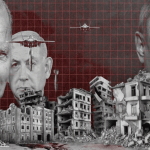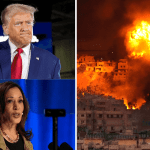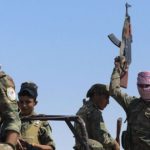After the conclusion of their meeting at noon on 12 October 1973, some of the attendees remained with Israeli prime minister Golda Meir and the Israeli minister of defence to discuss the situation assessments and debate the decisions that had caused disagreement.
Suddenly, sirens blared across Tel Aviv, signalling the start of the Egyptian-Syrian offensive at two minutes past two in the afternoon. Hours before this scene unfolded in Tel Aviv, General Samuel Gonen, commander of the Israeli Southern Command, had moved towards the Command Centre after receiving intelligence reports confirming that the Egyptian crossing of the Suez Canal would begin at 6:00 pm. Upon his arrival, he contacted General Abraham Mendler, commander of the Israeli armed forces in Sinai, to receive the latest information.
During this call, Gonen told Mendler that “it’s better to move the armoured divisions forward towards the front line, and by evening they should be in place.” Mendler replied that “it’s time [to do so] indeed; they are shelling me.” Gonen ended the call, and the attack began.
In the Israeli account of these events, titled “The Shortcoming,” what took place in the Israeli operations room that day are documented in the chapter called “The Black Day of Atonement.” Israeli chief of staff David Eliezer and deputy chief of staff Israel Tal rushed to the room and requested to see maps indicating the enemy’s movements and points of attack.
However, during those dramatic moments, a surprise occurred. No one could even draw the relevant arrows on the maps as the war was escalating so dramatically. Reports came in from Israeli fortified positions that Egyptian forces were crossing the canal and that soldiers and armoured vehicles were moving to Sinai together with hundreds of fibreglass boats.
From their crossing points on the western side of the canal, Egyptian battlegroups began sending armoured vehicles on floats eastwards. “The Shortcoming” describes the attack on the Israeli Bar Lev Line designed to fortify the eastern side of the canal based on the testimonies of Israeli soldiers at the time, all of whom expressed shock and astonishment at what was happening.
This part of the book concludes that “the first moments of the Day of Atonement War surprised the Bar Lev Line and its fighters completely. Despite the intermittent reports received from their leadership about the imminent danger and their orders to ‘absorb the first strike,’ the entire line was taken by complete surprise.”
When it became clear as a result of the intense shelling of the fortified line that the Egyptians had started crossing the canal and moving military units deep into Sinai, Israeli tanks were sent to the front lines to reinforce them and occupy firing positions along the canal. Here, another surprise awaited them, beyond the surprise of the war itself.
The Israeli tanks could not get close to the waterline. Many of them were hit when they were still a few hundred metres away from the earthen barrier along the canal, with many of them also not knowing what had hit them. Later, they realised that they had been hit by rockets fired from Egyptian missile bases west of the canal that had launched hundreds of the new “Sagger” anti-tank missiles at the Israeli tanks.
Shortly afterwards, the same missiles were launched from the east side of the canal, where tens of thousands of Egyptian soldiers had now crossed.
The Israeli tank crews were not prepared, and they lacked guidance systems. The soldiers inside the tanks were astounded, with one of them remarking, according to “The Shortcoming,” that “this felt like suicide.”
Baruch Shemir (Barry), a soldier in an Israeli armoured unit in the 1973 War, later recounted vivid details of the fierce combat between the two armies. Leave was cancelled for all the soldiers in Barry’s unit two days before the war began, and it was then deployed in the middle sector of the canal seven km from the waterline.
Most of the Israeli armoured units in Sinai were positioned in their training areas in the second line, and now they were tasked with reaching the waterline at designated crossing areas to prevent the establishment of bridgeheads or to obstruct the initial Egyptian advance.
Barry had served in the armoured unit for a year-and-a-half and worked as an ammunition loader in the commander’s tank. His tank stopped 400 metres from a small lake adjacent to the canal parallel to the waterline. Then it began firing. The tank crew relaxed when they saw that their targets were “infantrymen” and not Egyptian armoured vehicles. This realisation came as a relief, with Barry commenting that “for us, the tanks were the main problem – the enemy’s tanks (the first target), followed by anti-tank guns (the second target), and only then would we open fire on infantry.”
“But within a quarter of an hour, the commander’s tank had changed positions three times. I didn’t realise what was happening. We saw that the targets facing us were ‘infantrymen’ and not the Egyptian tanks we had never seen before. The other tanks in the platoon had no better luck. When we looked out from behind the sand hills, we saw flames. Those were the tanks of the platoon.”












